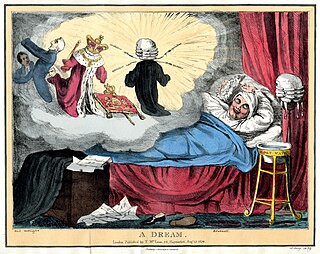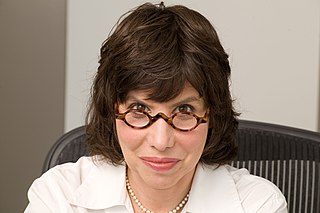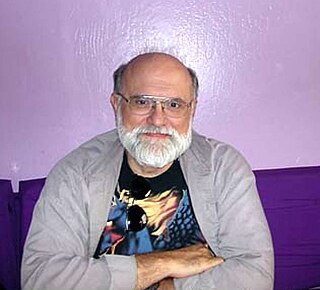In the psychology subfield of oneirology, a lucid dream is a type of dream wherein the dreamer realizes that they are dreaming during their dream. The capacity to have lucid dreams is a trainable cognitive skill. During a lucid dream, the dreamer may gain some amount of volitional control over the dream characters, narrative, or environment, although this control of dream content is not the salient feature of lucid dreaming. An important distinction is that lucid dreaming is a distinct type of dream from other types of dreams such as prelucid dreams and vivid dreams, although prelucid dreams are a precursor to lucid dreams, and lucid dreams are often accompanied with enhanced dream vividness. Lucid dreams are also distinct state from other lucid boundary sleep states such as lucid hypnagogia or lucid hypnopompia.
In psychoanalysis and other psychological theories, the unconscious mind is the part of the psyche that is not available to introspection. Although these processes exist beneath the surface of conscious awareness, they are thought to exert an effect on conscious thought processes and behavior. Empirical evidence suggests that unconscious phenomena include repressed feelings and desires, memories, automatic skills, subliminal perceptions, and automatic reactions. The term was coined by the 18th-century German Romantic philosopher Friedrich Schelling and later introduced into English by the poet and essayist Samuel Taylor Coleridge.

A dream is a succession of images, ideas, emotions, and sensations that usually occur involuntarily in the mind during certain stages of sleep. Humans spend about two hours dreaming per night, and each dream lasts around 5–20 minutes, although the dreamer may perceive the dream as being much longer than this.

A nightmare, also known as a bad dream, is an unpleasant dream that can cause a strong emotional response from the mind, typically fear but also despair, anxiety, disgust or sadness. The dream may contain situations of discomfort, psychological or physical terror, or panic. After a nightmare, a person will often awaken in a state of distress and may be unable to return to sleep for a short period of time. Recurrent nightmares may require medical help, as they can interfere with sleeping patterns and cause insomnia.

Dream interpretation is the process of assigning meaning to dreams.
A false awakening is a vivid and convincing dream about awakening from sleep, while the dreamer in reality continues to sleep. After a false awakening, subjects often dream they are performing their daily morning routine such as showering or eating breakfast. False awakenings, mainly those in which one dreams that they have awoken from a sleep that featured dreams, take on aspects of a double dream or a dream within a dream. A classic example in fiction is the double false awakening of the protagonist in Gogol's Portrait (1835).

In the field of psychology, the subfield of oneirology is the scientific study of dreams. Research seeks correlations between dreaming and knowledge about the functions of the brain, as well as an understanding of how the brain works during dreaming as pertains to memory formation and mental disorders. The study of oneirology can be distinguished from dream interpretation in that the aim is to quantitatively study the process of dreams instead of analyzing the meaning behind them.
Celia Elizabeth Green is a British parapsychologist and writer on parapsychology.
Sal Restivo is a sociologist/anthropologist.

Shaun Gallagher is an American philosopher known for his work on embodied cognition, social cognition, agency and the philosophy of psychopathology. Since 2011, he has held the Lillian and Morrie Moss Chair of Excellence in Philosophy at the University of Memphis and was awarded the Anneliese Maier Research Award by the Humboldt Foundation (2012–2018). Since 2014, he has been Professorial Fellow at the University of Wollongong in Australia. He has held visiting positions at Keble College, Oxford; Humboldt University, Berlin; Ruhr Universität, Bochum; Husserl Archives, ENS (Paris); École Normale Supérieure, Lyon; University of Copenhagen; and the Cognition and Brain Sciences Unit, Cambridge University. He is also known for his philosophical notes on the effects of solitary confinement.
Psychoanalytic dream interpretation is a subdivision of dream interpretation as well as a subdivision of psychoanalysis pioneered by Sigmund Freud in the early 20th century. Psychoanalytic dream interpretation is the process of explaining the meaning of the way the unconscious thoughts and emotions are processed in the mind during sleep.

Alison Gopnik is an American professor of psychology and affiliate professor of philosophy at the University of California, Berkeley. She is known for her work in the areas of cognitive and language development, specializing in the effect of language on thought, the development of a theory of mind, and causal learning. Her writing on psychology and cognitive science has appeared in Science, Scientific American, The Times Literary Supplement, The New York Review of Books, The New York Times, New Scientist, Slate and others. Her body of work also includes four books and over 100 journal articles.
Joseph Carroll is a scholar in the field of literature and evolution. He received his PhD in Comparative Literature from the University of California, Berkeley and is now Curators’ Distinguished Professor Emeritus at the University of Missouri–St. Louis.
Antti Revonsuo is a Finnish cognitive neuroscientist, psychologist, and philosopher of mind. His work seeks to understand consciousness as a biological phenomenon. He is one of a small number of philosophers running their own laboratories.
Patrick McNamara is an American neuroscientist. His work has centered on three major topics: sleep and dreams, religion, and mind/brain.
Joseph A. Bulbulia is a professor of psychology in the Faculty of Science at Victoria University of Wellington (2020–present). He was the Maclaurin Goodfellow Chair in the School of Humanities, Faculty of Arts at University of Auckland (2018–2020). He previously served as a professor in the School of Art History, Classics and Religious Studies at Victoria University of Wellington (2000–2017). Bulbulia is regarded as one of the founders of the contemporary evolutionary religious studies. He is a past president of the International Association for the Cognitive Science of Religion and is currently co-editor of Religion, Brain & Behavior. Bulbulia is one of four on the Senior Management Team of the New Zealand Attitudes and Values Study, a national longitudinal study started in 2009 that has repeatedly sampled over 45,000 New Zealanders. He is an associate investigator for Pulotu, a database of 116 Pacific cultures purpose-built to investigate the evolutionary dynamics of religion. In 2016 Bulbulia won a Research Excellence Award at Victoria University.
Lisa Bortolotti is an Italian philosopher who is currently professor of philosophy in the Department of Philosophy at the University of Birmingham, United Kingdom. Her work is in the philosophy of the cognitive sciences, including philosophy of psychology and philosophy of psychiatry, as well as bioethics and medical ethics. She was educated at the University of Bologna, King's College London, University of Oxford and the Australian National University, and worked briefly at the University of Manchester before beginning at Birmingham, where she has been a lecturer, senior lecturer, reader and now professor.

Allan Combs is an American psychologist and parapsychologist who attempts to combine his ideas of consciousness and systems theory.
Kelly James Clark is an American philosopher noted for his work in the philosophy of religion, the philosophy of science, and the cognitive science of religion. He is currently Senior Research Fellow at the Kaufman Interfaith Institute and Professor at Grand Valley State University in Grand Rapids Michigan.

Rev. Jeremy Taylor, DMin, was an American dream worker, author and Unitarian Universalist minister. He was a co-founder and past president of the International Association for the Study of Dreams.







